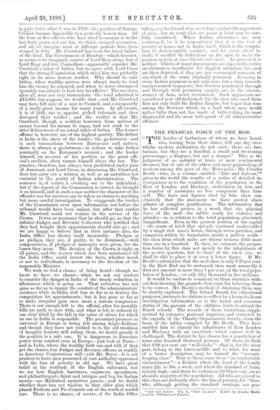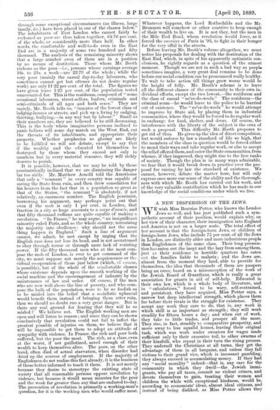THE PHYSICAL FORCE OF THE MOB.
" THE hordes of barbarians of whom we have heard, who, issuing from their slums, will one day over- whelm modern civilisation, do not exist : there are bar- barians, but they are a handful, a small and decreasing per-centage ; a disgrace, but not a danger." This is the judgment of no optimist at large, or mere sentimental dreamer, but of one of the ablest and most painstaking of workers among the poor of the Metropolis—Mr. Charles Booth—who, in a volume entitled "Life and Labour,"* gives to the world the results of a series of detailed in- vestigations as to the condition of the population in the East of London and Hackney, undertaken by him and a number of assistants no less competent than him- self. The facts and figures cited by him show con- clusively that the statement we have quoted above admits of complete justification. The information that he has collected proves, in a word, that the physical force of the mob—the rabble ready for violence and plunder—is, in relation to the total population, absolutely insignificant. Even in the poorest portion of the capital —the waste of brick that spreads eastward undiversified by a single rich man's house, through seven parishes, and comprises within its boundaries nearly a million souls— the class from which mobs are drawn reckons little more than one in a hundred. If, then, we estimate the propor- tion borne by this class not merely to the inhabitants of the poorer quarters, but to those of the whole city, we shall be able to place it at even a lower figure. If Mr. Booth's calculation that the mob class is only 1.23 per cent. in the East End can be sustained, then most assuredly it does not amount to more than 1 per cent, of the total popu- lation of London,—or only fifty thousand in five millions.
It would be useless to comment on these statistics with- out first showing the grounds that exist for believing them to be correct. Mr. Booth's method of obtaining them may be shortly explained. The School Board, for educational purposes, instructs its visitors to collect by a house-to-house investigation information as to the moral and economic status of the parents of the children liable to attend the Board schools. The records of these visitations, supple- mented by extensive personal inquiries, and corrected by the experts of the Charity Organisation Society, form the basis of the tables compiled by Mr. Booth. They have enabled him to classify the inhabitants of East London and Hackney with an exactitude which cannot well be challenged. The district he has chosen has a population of some nine hundred thousand persons. Of these, he finds that 8-88 per cent. are "well-to-do,"—that is, for the most part, belong to the lower-middle and to what, for want of a better description, may be termed the " servant- keeping -class." Next to them come those "in comfortable circumstances "—a division where the head of the family earns 22s. to 50s. a week, and where the standard of living, is fairly high—and these he reckons at 55'88 per cent., or an absolute majority of the population. All who are placed in this class are distinctly above the line of poverty, for " thes2 who, although getting the standard earnings, are poor • Life and tabour. Vol. I., "East Loudon." Bite l by 01 Arlen Booth. London; William and Norgate. through some exceptional circumstances (as illness, large family, &e.) have been placed in one of the classes below." The inhabitants of East London who cannot fairly be reckoned as poor are thus taken together, 64-76 per cent. of the whole, or considerably more than half. In other words, the comfortable and well-to-do even in the East End are in a majority of some two hundred and fifty thousand. The analysis of the remaining minority shows that a large number even of them are in a position by no means of destitution. Those whom Mr. Booth reckons as the poor—i.e., persons whose earnings average 18s. to 21s. a week—are 22-79 of the whole ; while the very poor (mainly the casual day-to-day labourers, who sometimes cannot get but oftener do not desire regular work) are only 11-22 per cent. of the total. The figures we have given leave 1-23 per cent. of the population tested unaccounted for. This is the residuum, composed of "some occasional labourers, street-sellers, loafers, criminals and semi-criminals of all ages and both sexes." They are mainly, Mr. Booth tells us, "inmates of the lowest class of lodging-houses or streets, and pick up a living by cadging, thieving, bullying,—in any way but by labour." Small as their numbers are, they are believed to be still decreasing.
This is the body whom imaginative persons inclined to panic believe will some day march on the West End, cut the throats of its inhabitants, and appropriate their property. Whether prophecies so gloomy are likely to be fulfilled we will not debate, except to say that if the wealthy and the educated let themselves be destroyed by those whom they exceed not only in numbers but in every material resource, they will richly deserve to perish.
It is possible, however, that we may be told by those Pessimistically inclined that we are dismissing the danger far too airily. Mr. Matthew Arnold told the Americans that only a " remnant " in every country was capable of saving the State from ruin, and then drew consolation for his hearers from the fact that in a population so great as that of the States, "the remnant" is alsolutely, if not relatively, an enormous number. The English pessimist, borrowing his argument, may perhaps point out that even if the mob is only 1 per cent. in London, that fraction in a city so huge amounts to a corps d'armis,e, and that fifty thousand ruffians are quite capable of making a revolution. "In France," he may argue, "an insignificant minority ruled Paris, and so the whole country, terrorising the majority into obedience : why should not the same thing happen in England." Such a line of argument cannot, we admit, be met except by urging that the English race does not lose its head, and is not accustomed to obey through terror or through mere lack of resisting power. If the fifty thousand men who at the most com- pose the mob of London, is ever to get command of the city, we must suppose not merely the acquiescence or the virtual co-operation of those just below (which, of course, is possible), but of the whole of the comfortable classes whose existence depends upon the smooth working of the social machine and the encouragement of industry by the maintenance of law and order. Of course, if the men who are now well above the line of poverty, and who com- pose the bulk of the population, were to be so foolish as to be misled into the belief that a socialistic upheaval would benefit them instead of bringing them utter ruin, then we should no doubt run a very great danger. But is there any real ground for fearing that they will be so misled ? We believe not. The English working men are open and will listen to reason ; and since they can be shown conclusively that revolution could not fail to inflict the greatest possible of injuries on them, we believe that it will be impossible to get them to adopt an attitude of sympathy with violence. In France, the rich and poor both suffered, but the poor the most. The rich, as a class, even at the worst, if not guillotined, saved enough of their wealth to keep themselves alive. The poor, on the other hand, often died of actual starvation, when disorder had dried up the sources of employment. If the majority of Englishmen do not realise this fact already, it is the business of those better informed to teach it them. It is not merely because they desire to stereotype the existing state of society that all reasonable persons oppose revolution by violence, but because it would mean miseries for the poor and the weak far greater than any that are endured to-day. The prevention of revolution is primarily a working-man's question, for it is the working men who would suffer most. Whatever happens, the Lord Rothschilds and the Mr. Brunners will somehow or other contrive to keep enough of their wealth to live on. It is not they, but the men in the Mile End Road, whom revolution would force, as it forced the ouvriers of Paris in '93, to fight in their hunger for the very offal in the streets.
Before leaving Mr. Booth's volume altogether, we must notice his proposals for dealing with the destitution of the East End, which, in spite of his apparently optimistic con- clusions, he rightly regards as a question of the utmost moment. Though we are not in such a bad way as people sometimes imagine, a very great deal remains to be done before our social condition can be pronounced really healthy. To wait to take action till things grow worse would be the height of folly. Mr. Booth's scheme is to leave all the different classes of the community to their own in- dividual efforts, except the two lowest,—the residuum and the class of casual " ne'er-do-weels." The residuum—the criminal scum—he would leave to the police to be harried out of existence. The " ne'er-do-weels " he would attempt to improve by State aid, by placing them in industrial communities, where they would be forced to do regular work in exchange for food, shelter, and dress. Of course, the interference with the liberty of the subject is the crux of such a proposal. This difficulty Mr. Booth proposes to get rid of thus. He gives up the idea of direct compulsion, but would enforce by law a standard of life so high, that the members of the class in question would be forced either to mend their ways and take regular work, or else to accept the relief offered them, and enter the State communities, from whence, if they improved, they might rise to the free ranks of society. Though the plan is in many ways admirable, we fear that it would break down in practice over the pro- posal for raising by law the standard of existence. We cannot, however, debate the matter here, but will only express once more our sense of the ability and the thorough- ness with which Mr. Booth has carried out his work, and of the very valuable contribution which he has made to our knowledge of the social conditions under which we live.



































 Previous page
Previous page